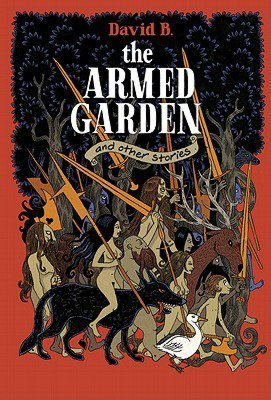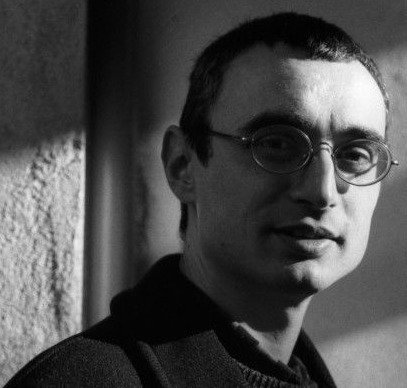
David B., the creator of the acclaimed Epileptic, gives full rein to his fascination with history, magic and gods, not to mention grand battles, in this literate, witty, and absorbing collection of stories—all based on historical fact, or at least historical legend, and delineated in a striking stylized two-color format. “The Veiled Prophet”: During the 8th century (the time of Harun al-Rashid, the Caliph of 1001 Nights fame), Hakim al-Muqanna, the lowly Persian fabric dyer, is assaulted and enveloped by a piece of white cloth come from the sky. When a bystander recognizes in the folds of the cloth the visage of Abu-Muslim, defender of the oppressed, al-Muqanna becomes a prophet and great leader—and within a year his followers have defeated seven armies sent to stop him! “The Armed Garden,” set in the 15th century, tells the story of the bloody quest for a Paradise on Earth. Rohan, a humble Prague blacksmith, is visited by Adam and Even who urge him lead his followers, soon dubbed “Adamites,” on this mission. They soon must contend, bloodily, with the rival Paradise-seekers the “Taborites,” led by John Zizka. “The Drum Who Fell in Love,” a sequel of sorts, begins with Zizka’s death: His people have him skinned and his skin stripped onto a drum, and the drum, speaking in Zizka’s voice, leads the Taborites into battle anew. But the touch of a beautiful girl softens Zizka’s spirit, and the unlikely couple begin a journey together…
Author

Pierre-François Beauchard, who uses the pen name David B., was one of the initiators of the French alternative editorial house L'Association, and is now well-known among the French comics audience. After his Applied Arts studies, David B. had his first publications in magazines such as Chic, Circus, Okapi and A Suivre. Among his early creations are 'Le Timbre Maudit', a story published in Okapi, and 'the mini-series 'Zèbre' in Chic. As a scenarist, he cooperated with Olivier Legan on 'Pas de Samba pour Capitaine Tonnerre', an album published by Glénat in 1985. After he co-founded L'Association in 1990, he began using the pseudonym David B. and specialized in short black-and-white stories, detailing nightmarish dreams, collected in the album 'Le Cheval Blême' in 1992. As powerful as his dream imagery is in itself, it is amplified by his masterful use of black and white drawings. In the Association's magazine Lapin, he published series like 'Le Prophète Voilé', 'Le Jardin Armé' and 'Le Voyage de l'Est'. From 1996, Beauchard has concentrated on the autobiographical series 'L'Ascension du Haut-Mal', which earned him the highest praise from comics critics. In addition to his work for L'Association, David B. cooperated with the publishing house Cornélius, where he published the quarterly comic book Le Nain Jaune from 1993 to 1994, as well as 'Les Quatre Savants' from 1996 to 1998. He was also present in the reviews Fusée and Le Cheval sans Tête (with 'Les Incidents de la Nuit'). Also present at Dargaud, he made 'Le Tengû Carré', an allegory of Japanese legends, and the scenarios of 'La Révolte d'Hop Frog' and 'Les Ogres', which were illustrated by Christophe Blain. For the publisher's collection Poisson Pilote, he made 'Urani - la Ville des Mauvais Rêves' (script by Joann Sfar) and 'Les Chercheurs de Trésor'. After May 2000 David B's work would reach a wider public when his artwork was featured in the collection Aire Libre by the popular publisher Dupuis. After 'Le Capitaine Écarlate' (with artwork by Emmanuel Guibert) in 2000, David wrote and drew the album 'La Lecture des Ruines' in 2001. David B has also been active as an illustrator for Le Seuil, Automne 67, Albin Michel and Coconino Press.